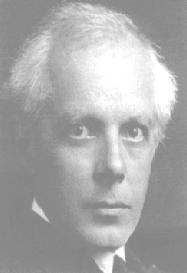![Piano's Solo Corner [Image]](piano8b.gif)
![Piano's Solo Corner [Image]](piano8b.gif)

| Date/Place of Birth: | 25 March, 1881 in Nagyszentmiklós, Hungary (now Rumania). |
| Personality: | A tiny, slim man but with a strong and stubborn integrity. Bartók was a
determined and industrious man - he would strive to achieve anything he needed desperately.
Because of his strong ambitious attitude, Bartók was therefore the world's outstanding specialist on Hungarian folk music. He collected primitive, raw folk songs and conducted research on them with great efforts. Moreover, Bartók was a powerful individualist who was prepared to stand up to the Establishment in defense of his music and his right. Even though his music was badly accepted at his time, he did not lost confidence and gave up easily but still stubbornly composed more pieces in the same manner. |
| Piano-Playing Style: | Like Prokofiev, Bartók treated the piano as a percussive instrument. He tended to play
the piano with heavy accents - producing a sharp, sudden attack.
Bartók also emphasized on strict tempo. Every notes were played very precisely in a totally strict time. And yet his playing was very masculine and strong - fond of playing fast continuous series of chords. |
| Music: | Bartók's music generally represents a combination of nationalism and 19th Century forms into a
highly individual, powerful music in 20th Century. His music was rich of primitive Hungarian folk elements. Bartók himself even claimed
that it was also peasant music that rooted firmly in his music.
Besides that, Bartók's music was more dissonant and harsh compared with Stravinsky's or Prokofiev's music. It was ear-splitting and slashing sound that had been claimed as a remarkable Bartókian style. Because of the percussive, loud and clashing sound, Bartók's music, especially in his orchestral and chamber works, was richly sonorous but more difficult to listen compared with Classical music by Beethoven etc. Therefore, to understand his music well, one has to listen it repeatedly in order to absorb the idiom of his works. Once it is, the music clears up into a direct emotional utterance. |
| Composing Habit: | Bartók was a highly creative and nationalist composer. He always added folk elements to his music in a new and daring manner. As there were so many
kind of folk music, he would use pentatonic, heptatonic or chromatic scale and other strange models in order to fit the folk element into his music. That was why Pierre Boulez considered him
as "the mature Debussy".
Besides that, Bartók often built works from motto themes, consisting of a few notes. In other words, he developed a 'cyclic' form that combined all elements and regenerated the main theme throughout the entire work. That was why Bartók's music was criticized as being lack of melody. Halsey Stevens, in his biography of Bartók, has written: "His short motives, are constantly regenerated. They grow organically; they proliferate; the evolutionary process is kinetic. Undoubtedly, it is unforbidable thematic logic where many motivic manipulations which seem carefully calculated were brought about intuitively." Lastly, Bartók's fond of big continuous chords; strange and irregular rhythm; dissonant seconds and sevenths; and those harmonies stemming from peasant music - all these make his music as one of the most individualistic mind of the 20th Century. |
| Bartók's Quote: | "It may sound odd, but I do not hesitate to say that the simpler melody, the more complex and strange may be the harmonizations and accompaniments that go well with it," Bartók explained his totally new approach to his music "It is possibly dangerous that Hungary will also surrender to this system of robbery and murder. How I could continue to live or similarly, working in a country is quite inconceivable." |
| Bartók's Death: | In final years, Bartók possibly suffered leukimia. His weight dropped drastically, down to 87 pounds. He was so weak and finally died in New York on 26 September, 1945. |